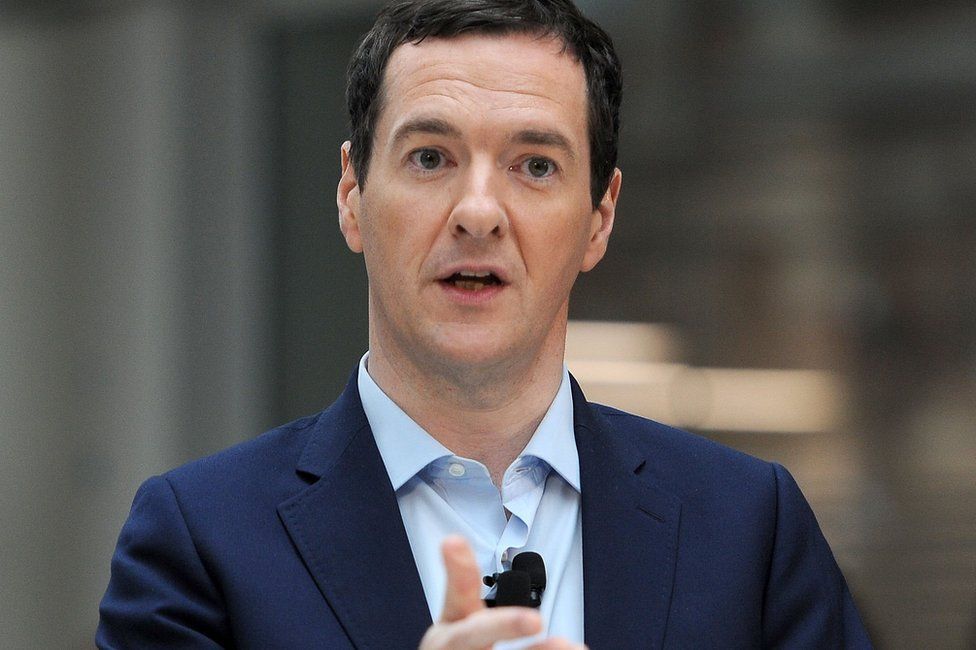UK 'did not vote for hard Brexit', George Osborne warns
- Published

Britain did not vote for 'hard Brexit' in the EU referendum and will have to compromise in exit talks, former Chancellor George Osborne has warned.
He said Leave campaigners were naive for thinking the UK could secure everything it wanted in negotiations.
In a speech in Chicago, he also warned against "the dangerous purity of splendid isolation" over co-operation.
He campaigned for the Remain side and was criticised for warning of a £30bn "black hole" if the UK voted to leave.
Mr Osborne's speech to the Chicago Council on Global Affairs is one of few public interventions he has made, since being sacked as chancellor when Theresa May became prime minister.
In it, he described the vote to leave Europe on 23 June as "one of the low points" of his time in government and warned Conservative colleagues now looking to negotiate Brexit that they faced "the most important set of decisions Britain has faced since the Second World War".
He is now a backbencher, but urged Prime Minister Theresa May to pursue "the closest possible economic and security relationship with our European partners while no longer being formal members of the EU".
Formal negotiations over the UK's withdrawal from the European Union cannot begin until the UK triggers Article 50 of the Lisbon Treaty, which Mrs May has said will not be before the end of the year.
"I can't see us consenting to the current arrangements around free movement of people that clearly caused such concern in the referendum," Mr Osborne said.
"Equally, I find some of the take-or-leave it bravado we hear from those who assume Europe has no option but to give us everything we want more than a little naive.
"We need to be realistic that this is a two-way relationship: that Britain cannot expect to maintain all the benefits that came from EU membership without incurring any of the costs or the obligations. There will have to be compromise."
Extreme government
He warned against the "false logic" of exiting all forms of European co-operation and against valuing "the dangerous purity of splendid isolation over the practical necessity of co-operation in the real world".
"Brexit won a majority. Hard Brexit did not," he said. "The mainstream majority in our country do not want to be governed from the extremes."
He said the government could not ignore the referendum result but said the EU would not be in a position for serious negotiations until autumn 2017 because of French and German elections.
The UK must not turn its back on Europe, he said, as huge issues such as terrorism, mass migration, disease and climate change could not be tackled alone.
In London on Friday, Martin Schulz, the President of the European Parliament, concluded a two-day visit including talks with Prime Minister Theresa May. He said the vote for Brexit was a "lose-lose" result for the UK and the EU.
"A G7 country, the second economy of the European single market, a permanent veto of the security council leaving the European Union is a disaster for us and for the United Kingdom," he said.
"Honestly, I leave London with a feeling that the Government is undecided about how and when they should trigger Article 50... also with the feeling that they perceive, more and more, the European side - the 27 institutions in Brussels and Strasbourg - can't wait too long."
Syria depression
In his speech in the US, Mr Osborne also defended the government's involvement in Libya - criticised by the foreign affairs committee earlier this month - and said governments should not be afraid of intervening in crises like Syria.
The Commons vote in 2013 against military action in Syria was "the single most depressing moment of my time to date in Parliament", he said.
Failing to intervene had led to the rise of the so-called Islamic State and a refugee crisis that had "fuelled the rise of extremism across Europe", and cost "hundreds of thousands of lives", he argued.
- Published14 September 2016
- Published28 March 2017